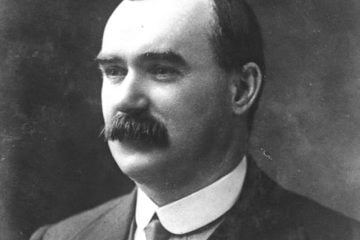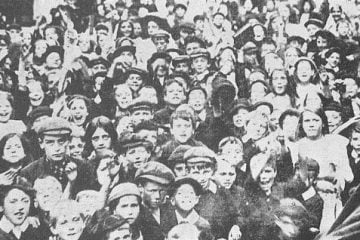“There’s a lot we can learn from Karl Marx” according to Jeremy Corbyn. “Marxism is not dead” — those are the words written in the corridors of Goldsmiths university. Indeed, Karl Marx may be dead and buried in Highgate cemetery, but his ideas are very much alive, both within the ranks of the labour movement and on university campuses.
We’re told that capitalism offers us a future of prosperity and social well-being, but many people, and young people in particular, are not deluded. Capitalism has dragged us into the worst crisis since the great depression. Mass unemployment and underemployment is back. Poverty, ignorance, wars and epidemics affect two-thirds of humanity. The very existence of humans is threatened by the ravishing of the planet in the name of profit.
In the 1990s, it was easy to dismiss Marxism. The fall of the Berlin Wall was taken to be the fall of Marxism itself. But today there is a revival of Marxism. Marx’s economic ideas are being proved correct as we speak, and the politics of revolution is becoming ever more popular.
This is not by accident. Marx’s ideas provide the sharpest tools with which to analyse and criticise capitalism. In fact, his criticisms of 19th century society are still extremely relevant in 21st century society, because, in its fundamentals, the capitalist system of Marx’s day is the same capitalist system of our time, albeit in a more developed form.
When we finish our education the first question that comes up is : “to whom are we going to sell our labour?”. Marx makes it clear: someone else will get the benefit of some of our labour. Marx’s theory of surplus value can be used to understand how capitalists profit, even nowadays, from the exploitation of workers.
It’s not hard to see how factory-workers in under-developed countries are exploited by capitalists, and with Marxist economic theory we can understand how this exploitation is the same for workers all over the world, the only difference being one of degree. Marx’s greatest contribution was his condemnation of exploitation under capitalism, not just in moralistic terms but in scientific ones. And this condemnation is as relevant today as it was when he wrote it.
Furthermore, Marx’s critique of commodification is still applicable today. The relentless search for profit which characterises capitalism means that anything and everything that can be commodified and sold for profit will be. This applies from healthcare to education, and one of the most horrific examples is children being sold for adoption over the internet. This is the barbarism that capitalism creates.
Imperialism, predicted by Marx and analysed in detail by Lenin, is still attempting to secure gains in many countries, oppressing and dominating millions of people around the world. And the economic crisis of 2008 is a crisis of overproduction – an inevitable product of the contradictions of capitalism as outlined by Marx.
The class struggle is still alive today as it was in the 19th century. In his pamphlet, Wage-Labour and Capital, Marx explains the dialectical and dependent nature of both wage-labour and capital, and how one sustains the other. Without capital, the wage-labourer cannot survive, as he receives no wages; and without wage-labour, capital cannot reproduce itself and profits cannot be made. This is why, as Marx explains in The Communist Manifesto, the capitalist class creates its own grave-diggers – the working class.
Marx explains that capitalist society developed out of the development of the forces of economic production under feudalism. His theory of history shows us the massive influences of economic forces in historical development. The fact is — and Marx demonstrates this — that to solve the contradictions and problems of society today we need a fundamental change to the entire system.
But his historical materialism also shows that economic forces aren’t enough to change society. Marx says that “class struggle is the locomotive of history” – economic crisis alone won’t be enough to put an end to capitalism. We still need to organise ourselves to struggle against the capitalist class in order to overthrow the capitalist economic system.
Marx takes the long view of history. Capitalism has not always existed. Like previous systems before it, it has sowed the seeds of its own destruction. Now, if we organise to overthrow it, the class struggle can consign capitalism to the dustbin of history, and we can move society onwards once again.
Socialism is the next step forward and communism will be the end of history as we know it, and the start of a new history for humanity.
As Marxists, we understand that problems such as poverty, unemployment, crises and war, are inevitable consequences of capitalism. They are the manifestation of private property and exploited labour. Just taxing the rich or borrowing money won’t fundamentally change this fact. The real solution is a radical change of the social order, i.e. a “communistic revolution” as Marx puts it at the end of the Communist Manifesto.
We must abolish private ownership of the banks, the utilities, and the 150 or so biggest businesses that control almost every aspect of our lives. We need to take control over the economy and plan it democratically so as to meet everyone’s basic needs. Only a socialist transformation of society can achieve the liberation of humankind.
With the state of capitalism today – the instability and economic crisis that is sweeping the globe – it’s surely impossible to disagree with Marx’s analysis. For liberals this is the cause of pessimism and demoralisation as their system collapses around their ears. But for revolutionary socialists the period opening up before us is a confirmation of everything Marx predicted. For us, 200 years since Marx’s birth, socialism is firmly on the agenda and we’ll fight with everything we’ve got to make it a reality.
by Emily Dickenson, UCL Marxists



